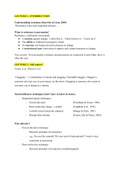LECTURE 1 - INTRODUCTION
Understanding resistance (Knowles & Linn, 2005)
“Resistance is the most important element ..
What is resistance to persuasion?
Resistance: a definition (weerstand)
● A reaction against change: ‘I don't like it’, ‘I don't believe it’, ‘I won't do it’
● The ability to withstand a persuasive attack
● An outcome: not being moved by pressure to change
● A motivational state: motivation to oppose and counter pressures to change
Note teacher: Not necessarily resistance and persuasion are connected to each other, but it is
often the case.
LECTURE 2 - Self control
Fennis et al; Wheeler et al
‘Chugging’ → Combination of charity and mugging. Charitable muggers. Mugger is
someone who rips you of your money on the street. Chugging is someone who wants to
convince you to donate to a charity.
Social influences techniques (don’t have to know by heart)
- Sequential request techniques:
- Foot-in-the-door (Freedman & Fraser, 1966)
- Door-in-the-face (large → small) (Cialdiniti et al., 1975)
- Lowball (extra kosten bij vakantie) (Burger & Petty, 1981)
- Disrupt-then-reframe (Fennis, Das & Pruyn, 2004)
Why effective?
- Foot-in-the-door technique
- Heuristic principle of consistency
- e.g., Do you like animals? Do you want to help animals? I want to stay
consistent in answering.
- Door-in-the-face technique
- Heuristic principle of reciprocity (wederkerigheid)
, - e.g., you don’t have enough money to buy one book, so the salesman tells
someone to buy only 1 book. Samen tegemoet komen.
“Automaticity is the cornerstone of all influence techniques” (Cialdini, 1993)
Key question
“How can we explain automatic, mindless compliance in a social influence situation?”
Because of self-control depletion
Self-control meaning
Ability to control your own thoughts, behavior or emotions. To control yourself.
Ego depletion / resource depletion / self-control depletion
Onderzoek. Een groep mocht niet denken aan een witte ijsbeer en een andere groep werd dat
niet verteld. Groep die niet mocht denken aan een witte ijsbeer at meer ijs dan de groep die
dat niet werd verteld.
Initial request depletes self-control (picture)
Initial request: do you like animals? Do you care about the environment? (step 1)
Target request: would you like to donate money? (step 2)
Decisional heuristic: Consistency, reciprocity, authority, liking, etc. (influence step 2)
Initial request(s)
- FITD (foot-in-door-technique) most effective when initial request is highly involving
(meta-analysis: Burger, 1999) (also holds for the other technique examples, true for all
the techniques)
- Highly involving entails:
- Demanding cognitive operations
- Active self-presentation, or both
Decision heuristic
- Resource depletion (uitputting/op) lowered resistance to counter attitudinal message
Because heuristic (the word because)
,“Can I please go ahead, because I have to make some copies?”
Wheeler et al. (2007)
2-stage model
Two experiments out of the Fennis et al., 2008
Stage 1: field experiment (effect on initial request on depletion)
- Single factor study (N = 46)
- Initial request (8 open-ended questions) vs. directions
- About health behavior and lifestyle
- How much do you monthly spend on sports and exercising
- Do you consciously pay attention to your eating habits?
- Asking for directions
- Current position
- Town railway-station
- Nearby street
- DV: self-control depletion
- Self-control measure; unsolvable figure tracing task
, t(44) = -3.41, p <.01, d = 1.05
Stage 2: 2 x 2 between-subjects design (effect on depletion on compliance) (Wheeler et al.)
- N = 108
- Self control depletion: depletion vs. no depletion
- Heuristic: reciprocity vs. no reciprocity (foot-in-the-door)
- DV: compliance with request to volunteer
- Self-control task: cross off all instances of the letter ‘e’ in the text below.
- No depletion condition: again, cross off all instances of the letter ‘e’ in the text
below
- Depletion condition: Cross off all instances of the letter ‘e’ in the text below,
but only if the ‘e’ is not adjacent to another vowel or one extra letter away
from another vowel
- Favor: being excused from completing a boring mathematical test
- Compliance measure: researchers of the department of communication studies are
looking for students, willing to voluntarily participate as an experimenter during
experimental research in this laboratory. If we’d ask you this favor, how much time
would you be willing to participate?
- 0 - 240 minutes
- Interaction: F(1, 104) = 10.22, p < .01
Take home
- Resistance to persuasion may depend on our ability to control our responses
- Motivation?




